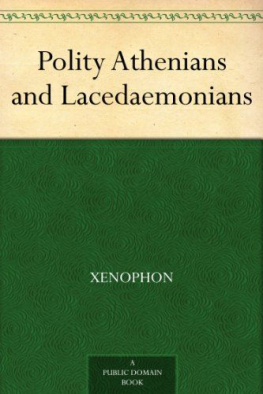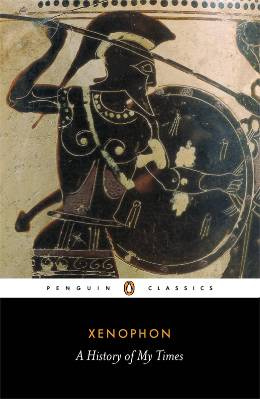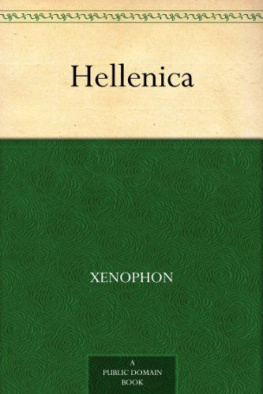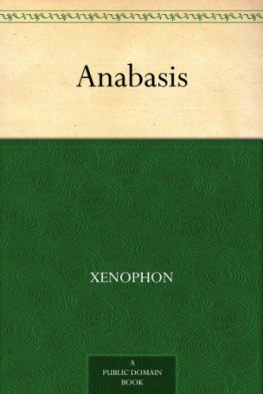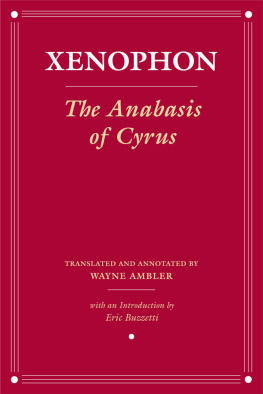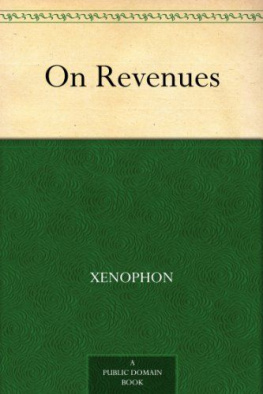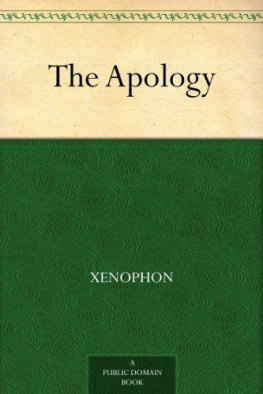Xenophon - Polity Athenians and Lacedaemonians
Here you can read online Xenophon - Polity Athenians and Lacedaemonians full text of the book (entire story) in english for free. Download pdf and epub, get meaning, cover and reviews about this ebook. year: 2012, genre: Science. Description of the work, (preface) as well as reviews are available. Best literature library LitArk.com created for fans of good reading and offers a wide selection of genres:
Romance novel
Science fiction
Adventure
Detective
Science
History
Home and family
Prose
Art
Politics
Computer
Non-fiction
Religion
Business
Children
Humor
Choose a favorite category and find really read worthwhile books. Enjoy immersion in the world of imagination, feel the emotions of the characters or learn something new for yourself, make an fascinating discovery.
Polity Athenians and Lacedaemonians: summary, description and annotation
We offer to read an annotation, description, summary or preface (depends on what the author of the book "Polity Athenians and Lacedaemonians" wrote himself). If you haven't found the necessary information about the book — write in the comments, we will try to find it.
Polity Athenians and Lacedaemonians — read online for free the complete book (whole text) full work
Below is the text of the book, divided by pages. System saving the place of the last page read, allows you to conveniently read the book "Polity Athenians and Lacedaemonians" online for free, without having to search again every time where you left off. Put a bookmark, and you can go to the page where you finished reading at any time.
Font size:
Interval:
Bookmark:
Xenophon the Athenian was born 431 B.C. He was a
pupil of Socrates. He marched with the Spartans,
and was exiled from Athens. Sparta gave him land
and property in Scillus, where he lived for many
years before having to move once more, to settle
in Corinth. He died in 354 B.C.
The Polity of the Lacedaemonians talks about the
laws and institutions created by Lycurgus, which
train and develop Spartan citizens from birth to
old age.
PREPARER'S NOTE
This was typed from Dakyns' series, "The Works of Xenophon," a
four-volume set. The complete list of Xenophon's works (though
there is doubt about some of these) is:
Work Number of books
The Anabasis 7
The Hellenica 7
The Cyropaedia 8
The Memorabilia 4
The Symposium 1
The Economist 1
On Horsemanship 1
The Sportsman 1
The Cavalry General 1
The Apology 1
On Revenues 1
The Hiero 1
The Agesilaus 1
The Polity of the Athenians and the Lacedaemonians 2
Text in brackets "{}" is my transliteration of Greek text into
English using an Oxford English Dictionary alphabet table. The
diacritical marks have been lost.
The Polity of the Lacedaemonians talks about the
laws and institutions created by Lycurgus, which
train and develop Spartan citizens from birth to
old age.
Now, as concerning the Polity of the Athenians, (1) and the type or manner of constitution which they have chosen, (2) I praise it not, in so far as the very choice involves the welfare of the baser folk as opposed to that of the better class. I repeat, I withhold my praise so far; but, given the fact that this is the type agreed upon, I propose to show that they set about its preservation in the right way; and that those other transactions in connection with it, which are looked upon as blunders by the rest of the Hellenic world, are the reverse.
(1) See Grote, "H. G." vi. p. 47 foll.; Thuc. i. 76, 77; viii. 48;
Boeckh, "P. E. A." passim; Hartman, "An. Xen. N." cap. viii.;
Roquette, "Xen. Vit." S. 26; Newman, "Pol. Arist." i. 538; and
"Xenophontis qui fertur libellus de Republica Atheniensium," ed.
A. Kirchhoff (MDCCCLXXIV), whose text I have chiefly followed.
(2) Lit. "I do not praise their choice of the (particular) type, in so
far as..."
In the first place, I maintain, it is only just that the poorer classes (3) and the People of Athens should be better off than the men of birth and wealth, seeing that it is the people who man the fleet, (4) and put round the city her girdle of power. The steersman, (5) the boatswain, the lieutenant, (6) the look-out-man at the prow, the shiprightthese are the people who engird the city with power far rather than her heavy infantry (7) and men of birth of quality. This being the case, it seems only just that offices of state should be thrown open to every one both in the ballot (8) and the show of hands, and that the right of speech should belong to any one who likes, without restriction. For, observe, (9) there are many of these offices which, according as they are in good or in bad hands, are a source of safety or of danger to the People, and in these the People prudently abstains from sharing; as, for instance, it does not think it incumbent on itself to share in the functions of the general or of the commander of cavalry. (10) The sovereign People recognises the fact that in forgoing the personal exercise of these offices, and leaving them to the control of the more powerful (11) citizens, it secures the balance of advantage to itself. It is only those departments of government which bring emolument (12) and assist the private estate that the People cares to keep in its own hands.
(3) Cf. "Mem." I. ii. 58 foll.
(4) Lit. "ply the oar and propel the galleys."
(5) See "Econ." viii. 14; Pollux, i. 96; Arist. "Knights," 543 foll.;
Plat. "Laws," v. 707 A; Jowett, "Plat." v. 278 foll.; Boeckh, "P.
E. A." bk. ii. ch. xxi.
(6) Lit. "pentecontarch;" see Dem. "In Pol." 1212.
(7) Aristot. "Pol." vi. 7; Jowett, "The Politics of Aristotle," vol.
i. p. 109.
(8) {klerotoi}, {airetoi}.
(9) Reading with Kirchhoff, {epeo tou}, or if {epeita}, "in the next
place."
(10) Hipparch.
(11) Cf. "Hipparch." i. 9; "Econ." ii. 8.
(12) E.g. the {dikasteria}.
In the next place, in regard to what some people are puzzled to explainthe fact that everywhere greater consideration is shown to the base, to poor people and to common folk, than to persons of good qualityso far from being a matter of surprise, this, as can be shown, is the keystone of the preservation of the democracy. It is these poor people, this common folk, this riff-raff, (13) whose prosperity, combined with the growth of their numbers, enhances the democracy. Whereas, a shifting of fortune to the advantage of the wealthy and the better classes implies the establishment on the part of the commonalty of a strong power in opposition to itself. In fact, all the world over, the cream of society is in opposition to the democracy. Naturally, since the smallest amount of intemperance and injustice, together with the highest scrupulousness in the pursuit of excellence, is to be found in the ranks of the better class, while within the ranks of the People will be found the greatest amount of ignorance, disorderliness, rascalitypoverty acting as a stronger incentive to base conduct, not to speak of lack of education and ignorance, traceable to the lack of means which afflicts the average of mankind. (14)
(13) Or, "these inferiors," "these good-for-nothings."
(14) Or, "some of these folk." The passage is corrupt.
The objection may be raised that it was a mistake to allow the universal right of speech (15) and a seat in council. These should have been reserved for the cleverest, the flower of the community. But here, again, it will be found that they are acting with wise deliberation in granting to (16) even the baser sort the right of speech, for supposing only the better people might speak, or sit in council, blessings would fall to the lot of those like themselves, but to the commonalty the reverse of blessings. Whereas now, any one who likes, any base fellow, may get up and discover something to the advantage of himself and his equals. It may be retorted: "And what sort of advantage either for himself or for the People can such a fellow be expected to hit upon?" The answer to which is, that in their judgment the ignorance and baseness of this fellow, together with his goodwill, are worth a great deal more to them than your superior person's virtue and wisdom, coupled with animosity. What it comes to, therefore, is that a state founded upon such institutions will not be the best state; (17) but, given a democracy, these are the right means to procure its preservation. The People, it must be borne in mind, does not demand that the city should be well governed and itself a slave. It desires to be free and to be master. (18) As to bad legislation it does not concern itself about that. (19) In fact, what you believe to be bad legislation is the very source of the People's strength and freedom. But if you seek for good legislation, in the first place you will see the cleverest members of the community laying down the laws for the rest. And in the next place, the better class will curb and chastise the lower orders; the better class will deliberate in behalf of the state, and not suffer crack-brained fellows to sit in council, or to speak or vote in Parliament. (20) No doubt; but under the weight of such blessings the People will in a very short time be reduced to slavery.
Font size:
Interval:
Bookmark:
Similar books «Polity Athenians and Lacedaemonians»
Look at similar books to Polity Athenians and Lacedaemonians. We have selected literature similar in name and meaning in the hope of providing readers with more options to find new, interesting, not yet read works.
Discussion, reviews of the book Polity Athenians and Lacedaemonians and just readers' own opinions. Leave your comments, write what you think about the work, its meaning or the main characters. Specify what exactly you liked and what you didn't like, and why you think so.

